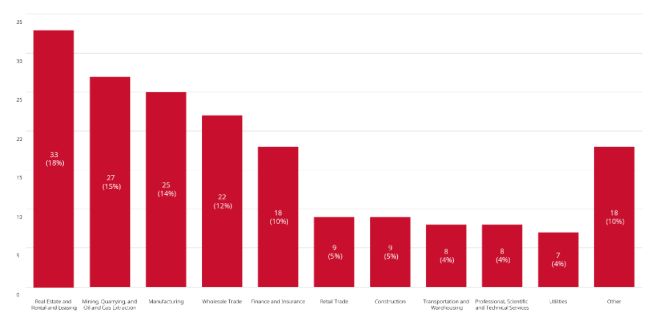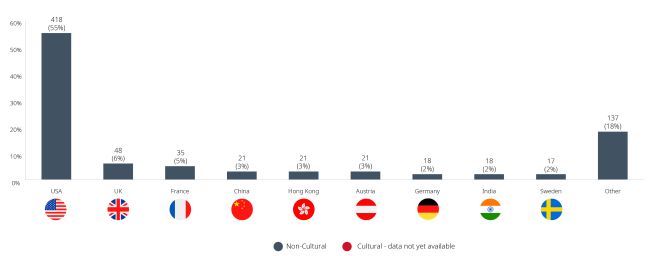Welcome to the December issue of Blakes Competitive Edge, a monthly publication of the Blakes Competition, Antitrust & Foreign Investment group. Blakes Competitive Edge provides an overview of recent developments in Canadian competition law, including updates on enforcement activity by the Canadian Competition Bureau (Bureau), recent initiatives and key trends.
Key Highlights
- Merger review activity in 2022 continues to slow, with 184 merger reviews completed to the end of November. This is a 9.8% decrease over the same period in 2021 (204).
- The Bureau obtains a court order to advance its investigation into the Dufresne Group's marketing practices
- The Bureau publishes its third and final report on its digital health care market study, which discusses how adopting compensation and mobility rules for health care providers can lead to greater competition and choice for participants in public health care systems
- The Minister of Innovation, Science and Industry proposes amendments to the Investment Canada Act to expand the national security review regime and increase penalties for non-compliance
Merger Monitor
November 2022 Highlights
- 16 merger reviews completed
- Primary industries: real estate and rental and leasing (31%); mining, quarrying, and oil and gas extraction (25%); finance and insurance (13%)
- Zero consent agreements (remedies) filed
- Nine transactions received an Advance Ruling Certificate (56%); seven transactions received a No Action Letter (44%)
January – November 2022 Highlights
- 184 merger reviews completed
- Primary industries: real estate and rental and leasing (18%); mining, quarrying, and oil and gas extraction (15%); manufacturing (14%); wholesale trade (12%); finance and insurance (10%)
- Six consent agreements (remedies) filed
- One judicial decision filed
- 97 transactions received an Advance Ruling Certificate (53%); 80 transactions received a No Action Letter (43%)

Merger Enforcement Activity
Witness testimony and oral arguments conclude in Rogers-Shaw hearings at the Competition Tribunal
- The hearings in the Bureau's challenge of the Rogers-Shaw merger concluded on December 14, 2022, after four weeks of witness testimony and two days of oral argument. The Commissioner and respondents filed their final arguments on December 9, 2022, followed by compendia and presentations for oral arguments on December 13, 2022. Chief Justice Crampton of the Competition Tribunal has stated he would like to release a decision before Christmas, if possible.
Other Enforcement Activity
Bureau obtains court order to advance investigation into Dufresne Furniture's marketing practices
- On November 22, 2022, the Bureau announced that it had obtained an order from the Federal Court of Canada to compel the Dufresne Group, Inc. (Dufresne) and its affiliates (TDG Furniture, Inc., DFA Operations, Inc. and Furniture Investment Group, Inc.) to produce records and information relevant to the Bureau's investigation into allegations that Dufresne had made false or misleading urgency cue claims relating to the end dates of sales and potentially inflated regular prices used when making savings claims. The Bureau takes the position that urgency cue claims such as "countdown clocks" could be false or misleading if they create the impression that consumers must purchase a product quickly prior to the end of the promotion when in fact the promotion is renewed or replaced by another promotion.
Non-Enforcement Activity
Bureau publishes report on the digital health care market
- On November 24, 2022, the Bureau published its third and final report as part of its market study on the digital health care market. The final report examines the public health care system and recommends ways in which Canadian governments and policymakers can improve how health care providers work within Canada's public health system. The report highlights current payment models, current licensing requirements across Canada, and existing policies such as scope of practice rules and professional guidelines as barriers to competition that limit health care providers' ability to provide digital health products and services. The Bureau issued three recommendations to help foster greater competition between health care providers: (i) review payment models to support the appropriate use of digital technology, (ii) implement licencing frameworks that allow providers, where appropriate, to practice beyond provincial and territorial borders, and (iii) review and modernize policies to facilitate the effective uptake of digital health care. For more information about the Bureau's first and second reports on its digital health care study, see the July 2022 and October 2022 editions of Blakes Competitive Edge.
Bureau makes submissions to OECD Best Practice Roundtables on Competition Policy
- On December 1, 2022, the Bureau made submissions in response to two OECD roundtables on competition policy. First, in a submission to the OECD's Roundtable on Data Screening Tools in Competition Investigations, the Bureau outlines its approach and use of data screening algorithms in detecting cartel-like conduct in bidding data. The Bureau sees such tactics as a complement to existing law enforcement techniques, such as the Bureau's Immunity and Leniency Programs and its Collusion Risk Assessment Tool. Second, in a submission to the OECD's Roundtable on Director Disqualification and Bidder Exclusion, the Bureau discusses Canadian law and policy on director disqualification and supplier debarment from bidding on future contracts following criminal conviction under the Competition Act. The Bureau's submission notes that the Bureau is considering preparing a formal policy on director disqualification and suggests that Canadian debarment law and policy should be changed to exempt bidders who have received immunity or leniency pursuant to the Bureau's Immunity and Leniency Programs, as the risk of debarment can hinder parties from participating in such programs.
Investment Canada Act
Non-Cultural Investments
August 2022 Highlights
- Zero reviewable investment approvals and 98 notifications filed (73 for acquisitions and 25 for the establishment of a new Canadian business)
- Country of origin of investor: U.S. (57%); Austria (5%); Hong Kong (4%); Switzerland (4%); Germany (4%); U.K. (3%); France (3%); Japan (3%)
January – August 2022 Highlights
- One reviewable investment approval and 753 notifications filed (559 for acquisitions and 194 for the establishment of a new Canadian business)
- Country of origin of investor: U.S. (55%); U.K. (6%); France (5%); China (3%); Hong Kong (3%); Austria (3%)

Government of Canada Proposes Amendments to Investment Canada Act
- On December 7, 2022, the Minister of Innovation, Science and Industry (Minister) tabled legislation to amend the Investment Canada Act. If passed, the amendments would impose a new, pre-closing filing requirement in certain business sectors, allow for the imposition of interim conditions in respect of investments subject to a national security review, allow the Minister to accept undertakings to mitigate likely national security risk, and introduce stronger penalties for non-compliance with the Investment Canada Act, among other changes. To read more about the proposed amendments, please see our December 2022 Blakes Bulletin.
Blakes Notes
- To read more thought-leadership insights from the Competition, Antitrust & Foreign Investment group, please click here.
The content of this article is intended to provide a general guide to the subject matter. Specialist advice should be sought about your specific circumstances.


